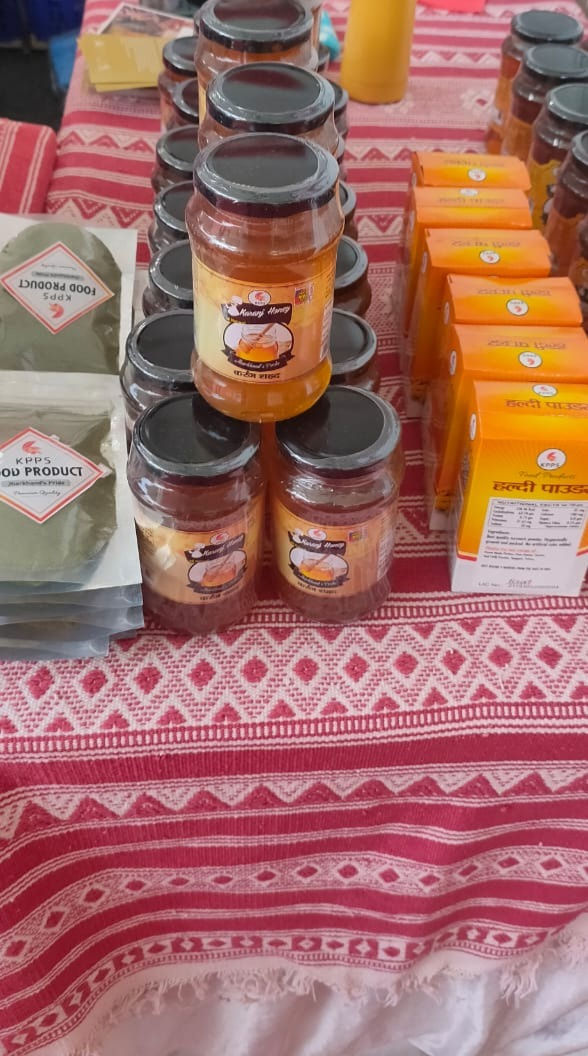Providing Platforms To Adivasi Entrepreneurs: Tribal Trade Fair Ranchi 2022.
- Pushpika Sapna Bara

- Oct 17, 2022
- 2 min read
Young Adivasi entrepreneurs marketed organic and indigenous products at the Tribal Trade Fair, held at Loyola ground, Ranchi, from the 14th to 16th of October 2022.

Adivasi entrepreneurs from all over Jharkhand, participated in the Tribal Trade Fair, 2022, held in Ranchi. The objective of the fair was to promote young Adivasi entrepreneurs and facilitate their entry into mainstream businesses. Mahua Majhi of Jharkhand Mukti Morcha was an eminent guest at the fair on the opening day, 14th of October.

Organized by Sri Sai Self Supporting Industrial Cooperative Society Limited (SSSSICSL), the fair included over 50 entrepreneurs marketing traditional food items like 'madua'; improvised forest produce made out of honey, and tamarind; traditional clothing; traditional paintings by Adivasi artists; medicinal herbs and indigenous handicrafts.

The Rustic Door introduced Dokra and Sohrai Art, indigenous to Jharkhand and marketed wrought iron crafts and art including Chhau masks. Arouse Gumla, specializing in sericulture and food processing items sold traditional ‘gamchas’ (a long piece of traditional cloth used in covering the upper half of the body), handmade purses and wallets. The School of Music, Art and Training, SMART, sold Kovar art paintings and 'Mandar' (traditional drumming instrument). Arjnit Honey and Spices, from Daladili, marketed organic flavoured honey, some mixed with spices. Rashmi Bridal, one of the oldest bridal wears in Ranchi, also participated in the fair. The fair also witnessed stalls selling pickles made by Adivasi women from rural areas. Young Adivasi women like Suzana Michael, marketed accessories, phone charms, rings, mask chains and decorative items made of beads, at Beadsncharms. The fair was also marked by various food stalls, tattoo artists, hair experts, home decor items and items of daily use which were handmade.

Panel discussions were held simultaneously at the fair. Many entrepreneurs who participated in the fair were invited to speak as panellists. The panellists discussed various hurdles challenging Adivasi entrepreneurs, ‘capital’ being one of the most important ones. Adivasis have only recently entered into business practices and although the young Adivasi entrepreneurs are showcasing innovation and creativity, they are facing difficulty with capital and investments. Discussions were also held around cottage industries which are marked by a large number of Adivasi rural women.
While the fair was described by some as a decisive step in the promotion of Adivasi entrepreneurs and indigenous products, some also raised concerns about the exorbitant amount charged for the display stalls from Adivasis, by the organizers, especially because many of these entrepreneurs belonged to rural areas or were young talents without any ancestral money or business backgrounds. Arjnit Honey and Spices, were witnessed displaying traditional baskets made of ropes and bamboo by young Adivasi women, who could not participate in the fair due to the high prices of the displaying stalls.





Why should anyone invest in cryptocurrency? Because in a world that’s rapidly going digital, crypto represents the key to future wealth. It’s like being handed the blueprints to the next financial empire, one that’s built on blockchain technology and decentralized finance. But to build that empire, you need the right tools. Enter OWNR Wallet, the ultimate digital wallet for all your crypto needs. With OWNR, you can store, exchange, and buy Bitcoin and other cryptocurrencies, all while enjoying top-notch security. It’s like having a vault for your digital assets, with everything you need to manage your investments at your fingertips. And for those who want to take their crypto game to the next level, OWNR’s blog offers a comprehensive guide…